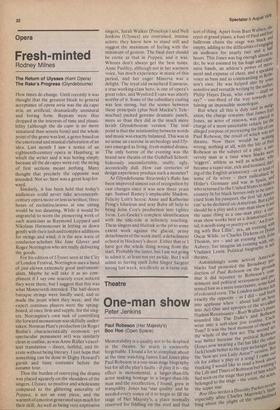Opera
Fresh-minted
Rodney Milnes
The Return of Ulysses (Kent Opera) The Rake's Progress (Glyndebourne)
How times do change. Until recently it was thought that the greatest block to general acceptance of opera seria was the da capo aria, an artificial, dramatically unnatural and boring form. Repeats were thus dropped in the interests of time and plausibility (although the da capo is no more unnatural than sonata form) and the whole point of the genre was lost, a genre based on the emotional and musical elaboration of an idea. Last month I saw a notice of an eighteenth-century opera in Hamburg, in which the writer said it was boring simply because all the da capos were cut: the string of first sections meant nothing. Many thought that precisely the opposite was intended. Not so: here was a great leap forward.
Similarly, it has been held that today's audiences could never take seventeenthcentury opera more or less as written; three hours of recitative/arioso at one sitting would be too daunting. While it would be ungrateful to scorn the pioneering work of such musicians as Raymond Leppard and Nikolaus Harnoncourt in letting us down gently with their lush and complex additions for strings and wind, it is the new wave of conductor-scholars like Jane Glover and Roger Norrington who are really delivering the goods.
For his edition of Ulysses seen at the City of London Festival, Norrington uses a band of just eleven extremely good instrumentalists. Maybe he will take it as no compliment if I say one scarcely even noticed they were there, but I suggest that this was what Monteverdi intended. The half-dozen baroque strings were hardly used, and so made the point when they were, and the expert continuo players were the springboard, at once firm and supple, for the singers. Norrington's own task of controlling the forward momentum was skilfully undertaken. Norman Platt's production (in Roger Butlin's characteristically economic yet spectacular permanent set) was similarly clean in outline, as was Anne Ridler's excellent translation — direct, faithful, and literate without being literary. I just hope that something can be done to Digby Howard's garish and fussy costumes before the autumn tour.
Thus the burden of conveying the drama was placed squarely on the shoulders of the singers. Ulysses, so positive and wholesome compared to the glittering amorality of Poppea, is not an easy piece, and the warmth of emotion generated says much for their skill. As well as being very expressive singers, Sarah Walker (Penelope) and Neil Jenkins (Ulysses) are restrained, intense actors; they know how to stand still and suggest the maximum of feeling with the minimum of gesture. The final duet should be erotic as that in Poppea, and it was. Whores don't always get the best tunes. Anne Pashley, although not in her warmest voice, has much experience in music of this period, and her eager Minerva was a delight. The loyal old swineherd Eumaeus, a true working-class hero, is one of opera's great roles, and Wynford Evans was utterly worthy of it. Some of the subsidiary casting was less strong, but the scenes between these principals (plus Neil Mackie's Telemachus) packed genuine dramatic punch, more so than they did in the much more lavish Glyndebourne version. The real point is that the relationship between words and music was exactly balanced. This was in no sense an exercise in archeology and Ulysses emerged as living, fresh-minted drama. The only horror of the evening was ale brand new theatre of the Guildhall School: hideously uncomfortable, stuffy, ugly, acoustically dull. How can centuries of design experience produce such a monster?
At Glyndebourne Stravinsky's Rake has been improved almost out of recognition by cast changes since it was new three years ago. Samuel Ramey's implacable Shadow, Felicity Lott's heroic Anne and Katherine Pring's hilarious and sexy Baba all help to bring John Cox's production into tighter focus. Leo Goeke's complete identification with the title-role is infinitely touching. These singers and Haitink in the pit to some extent work against the glacial, prissy detachment of the work itself, a detachment echoed in Hockney's decor. Either that or I have got the whole thing wrong from the start. Probably the latter, but I am not going to admit it, at least not yet awhile. But! will admit to having spelt John Singer Sargent wrong last week, needlessly as it turns out.






























 Previous page
Previous page